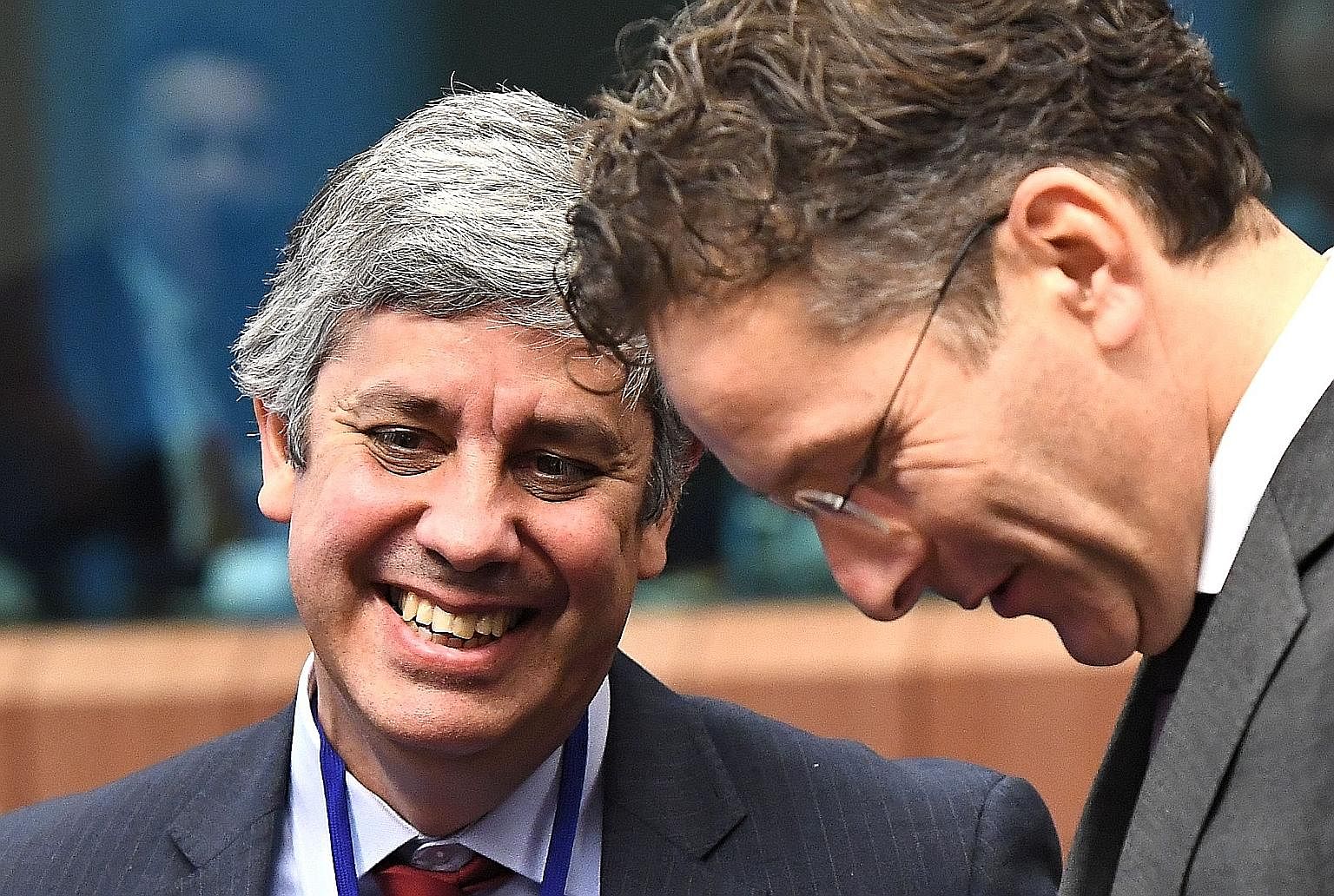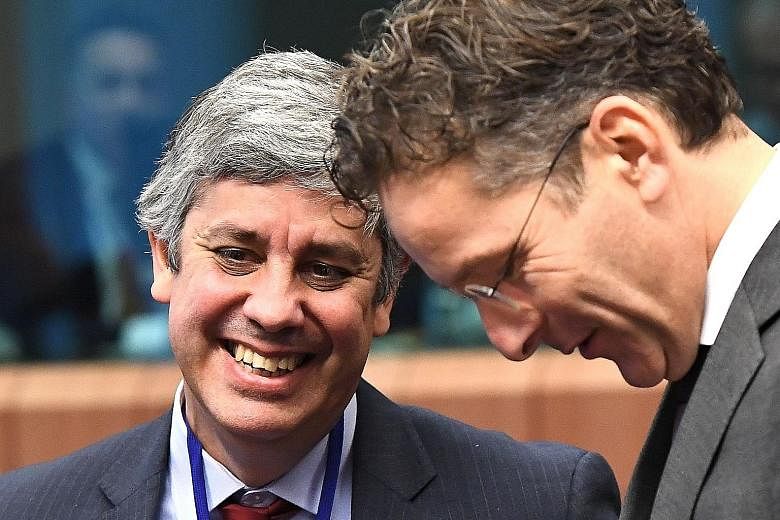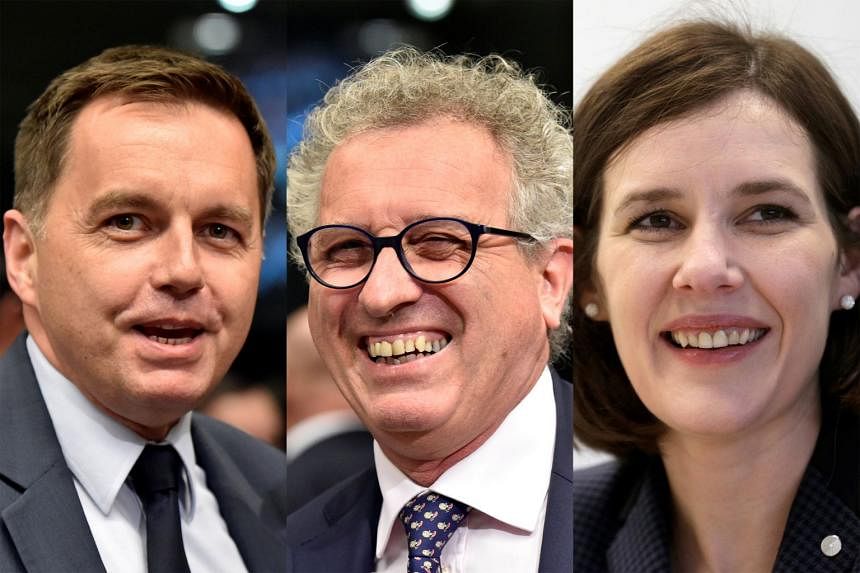The European Union (EU) has announced the shortlist of four candidates competing to lead one of EU's most powerful, yet also most ill-defined, positions: president of the Eurogroup, the 19-nation association of finance ministers from European nations which use the euro as their currency.
Officially, the EU member states claim that they are looking for "the best candidate regardless of political or geographic connections", as Mr Peter Altmaier, Germany's Acting Finance Minister puts it.
In practice, politics and geography will, as always, be crucial determinants.
Yet, whoever the new president is, he or she faces the massive task of managing thorny questions, such as how to overhaul the EU's banks, or manage the growing Franco-German divide over the single currency's future.
Mr Jeroen Dijsselbloem, the incumbent and until recently, a finance minister of the Netherlands, has served as Eurogroup president since 2013.
The 51-year-old has often been a controversial figure. Sharp-witted and good before TV cameras, the Dutchman quickly became the "human face" of the euro, the one EU politician able to explain in simple terms what governments were doing to maintain the stability of their currency.
He also ably steered the Eurogroup through the difficult and often divisive negotiations to bail out nations facing bankruptcy.

But Mr Dijsselbloem also divided Europe by sticking firmly to the position of Germany that current European treaties do not allow the EU to accept joint responsibility for the debts of its member states, that nations have only themselves to blame if they allow their debts to mushroom, and that while member states can get cheap temporary loans to avoid going bankrupt, these will come with strict conditions, including demands that nations put their finances in order regardless of the pain.
"European solidarity is not charity," as the head of the Eurogroup once memorably said.

This put Mr Dijsselbloem in direct conflict with mainly southern European politicians in countries such as Greece, Italy, Spain and France, who viewed his stance as offensive, politically unsustainable and merely an invitation to future financial crises.
"Europe will only be credible as a common project on the day when Mr Dijsselbloem stops being head of the Eurogroup," Portuguese Prime Minister Antonio Costa said recently.
Mr Dijsselbloem's term ends in January, and the leading contender to replace him is probably Portuguese Finance Minister Mario Centeno. He comes from Europe's south, and is therefore presumed to be sympathetic to the plight of the continent's less financially secure nations.
He and another contender, Slovakia's Finance Minister Peter Kazimir, both hail from the centre-left political camp in Europe, a further potential reassurance that the social price paid in Europe in order to uphold currency stability will not be forgotten. The continent's old divisions may, therefore, be papered over by the change of leadership.
Also in the running are Luxembourg's Pierre Gramegna and Latvia's Dana Reizniece-Ozola.
Still, the next Eurogroup president will face the same immutable obstacles: the suspicion of Germany, Europe's biggest economy; about anything that smacks of an obligation to bail out a country; and the fact that the next German government is likely to be weak and may therefore shun any Euro experiments.
One area where the Eurogroup hopes to make progress is that of putting in place a common insurance scheme to deal with European banks which may face liquidity difficulties in the future.
That would ensure that no EU country would shoulder alone the burden of bailing out a failing bank, and thereby remove one of the key sources of instability in Europe's financial system.
But the Germans, who fear that the banks' insurance scheme would lead to future costly bailouts, insist that they will not allow it to go ahead until EU banks, and particularly those in Italy, fully identify their current bad loans, which may be as high as €1 trillion (S$1.6 trillion). In effect, the Germans are saying that a bank insurance scheme will apply to a future, rather than the current, crisis.
There is also no agreement on the broader reforms of the Euro. French President Emmanuel Macron has outlined grand schemes for the creation of a joint European finance ministry, a large common European budget to fund investment, and a euro zone Parliament.
The Germans, however, want to give more powers to the euro zone's German-dominated bailout fund, which could be asked to force mandatory financial measures on countries that turn to it for help, precisely what the south Europeans are desperate to avoid.
The new Eurogroup president will have great influence over all these debates, if only because the group's roles are still ill-defined, and much depends on behind-the-scenes compromises.
But he can only succeed if the Eurogroup member states understand that, ultimately, they can only proceed as far as Germany wants them to go, and no further.



